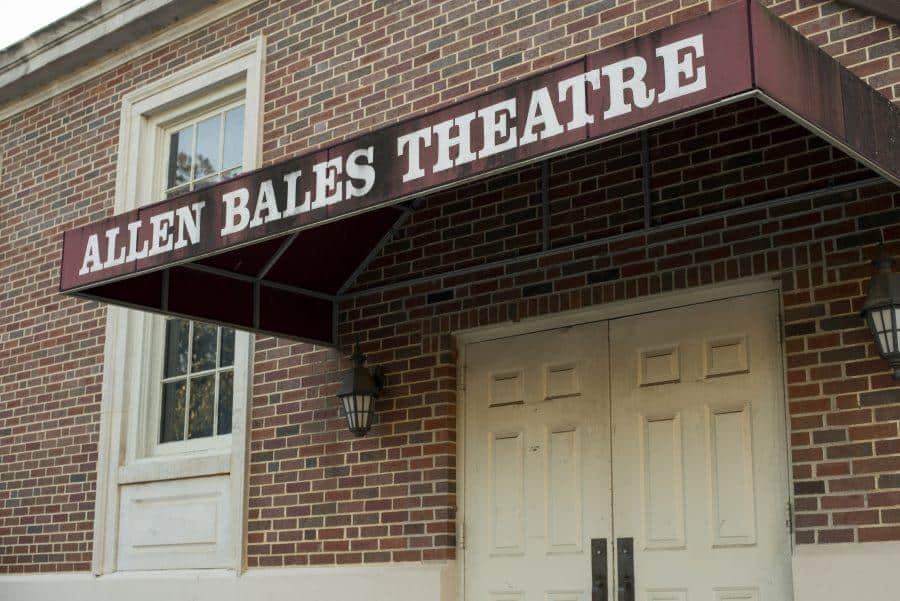On the coast of the southernmost tip of South Africa is a small country called Namibia, inhabited mostly by the Damara, Nama, San, and Herero people. In 1884, in a mostly colonialized Africa, Otto von Bismarck took control over Namibia, making it a German colony under subjugation to a European power. Between the years 1904 and 1907, both the Namaqua and the Herero people hatched a rebellion to overthrow their German colonialists. Germany responded with violent force, murdering most of the Herero people, culminating into what is considered to be the first genocide to ever take place in the 20th century.
“We Are Proud to Present…” – which opened last night at the Allen Bales Theatre – is about that story. Directed by Elizabeth Kirkland, a second year graduate student in directing, the play is rife with themes of institutionalized racism and the human experience as a whole. The play takes a dramatic-comedy improvisational look at human atrocity, bringing to light both the events that unfolded over a century ago, and also the propensity and scale of human error and prejudice.
Amber Scales, a senior double majoring in theater and public relations, plays actor 6 in the play and relates her own personal experiences to the story.
“I was originally going to law school, but around my second semester of my freshman year, I realized that theater was something I really missed, given that I did it in high school a lot,” Scales said. “I wanted another opportunity to act, so I auditioned for several roles for the theater department. Eventually, the head of the theater department pulled me aside and said ‘Maybe you should consider this as a real choice’. At first I was skeptical — as I wanted to support myself financially — but eventually I decided to add theater as my second major.”
Actors use improvisation to bring this production to life.
“I think the most interesting aspects of the play are the elements of improv,” Scales said. “So much of the show is us as actors working through the process of creating art, which is very organic in of itself. We’re playing off each other and trying to find something, which is something that happens often in the audition and rehearsal process, so it’s really interesting to recreate that experience every night.”
The subtle, and sometimes overt, racial tensions of the United States — particularly on The University of Alabama campus — are also examined in full focus.
“I think this show is one in that will start a dialogue,” Scales said. “The beginning is funny and humanizes these characters and you get to know them and who they are as their own flaws unfold towards the end of the play. It takes away easy answers and presents them as people who should have taken the time to examine their actions, and not just listen, but to really listen and learn from those mistakes, and I think the student body will definitely see that and take some of that home with them”
Molly Penny is a senior double majoring in musical theater and French, and is the assistant director of the play. She’s been performing since she was very young, and this play has been especially special to her.
“It’s definitely meant to be seen, not read, as a play doesn’t have that same effect unless it is being performed live,” Penny said. “It’s an important show to do now, as it explores racial tensions through a lens that someone wouldn’t expect.”
Despite the scale of the Herero and Namaqua genocide, it’s not very well known to most people and doesn’t get talked about often. Emma Schenkenberger, the marketing manager of the production, as well as a third year masters student working towards an MFA in arts management, expounded on the challenge of presenting a little-known historical event to southern audiences.
“This is the southeastern production and the first time the play has ever been shown in the south,” Schenkenberger said. “That’s been a really unique challenge in a good way, because you have to communicate it differently to a southern audience as compared to other places in the country. It deals with issues that I feel like aren’t always dealt with in the south — or at least not talked about as openly. So it’s been very interesting talking and promoting about it in Alabama.”
Showings of the play run at 7:30 p.m through Sept. 29 and on October 1 at 2 p.m and 7:30 p.m. Tickets are $10 at the Rowand-Johnson Hall ticket office, or by calling (205)-348-3400 or ordering online at ua.tix.com. For more information about “We Are Proud to Present,” as well as a calendar for other productions, visit https://theatre.ua.edu/









